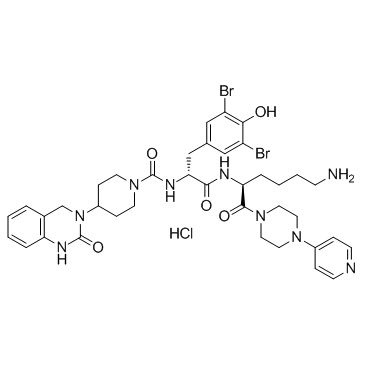Olcegepant hydrochloride
Modify Date: 2025-08-25 10:56:53

Olcegepant hydrochloride structure
|
Common Name | Olcegepant hydrochloride | ||
|---|---|---|---|---|
| CAS Number | 586368-06-1 | Molecular Weight | 906.11 | |
| Density | N/A | Boiling Point | N/A | |
| Molecular Formula | C38H47Br2N9O5.HCl | Melting Point | N/A | |
| MSDS | N/A | Flash Point | N/A | |
Use of Olcegepant hydrochlorideOlcegepant hydrochloride is the first potent and selective non-peptide antagonist of the calcitonin gene-related peptide 1 (CGRP1) receptor with IC50 of 0.03 nM and with a Ki of 14.4 pM for human CGRP. |
| Name | Olcegepant (hydrochloride) |
|---|---|
| Synonym | More Synonyms |
| Description | Olcegepant hydrochloride is the first potent and selective non-peptide antagonist of the calcitonin gene-related peptide 1 (CGRP1) receptor with IC50 of 0.03 nM and with a Ki of 14.4 pM for human CGRP. |
|---|---|
| Related Catalog | |
| Target |
IC50: 0.03 nM (CGRP1)[1] Ki: 14.4 pM (hCGRP)[2] |
| In Vitro | Olcegepant possesses higher affinity for the human CGRP receptor than the endogenous ligand CGRP and 150-fold higher affinity compared to the peptidic antagonist CGRP8-37. Olcegepant reverses CGRP-mediated vasodilation in human cerebral vessels and inhibits neurogenic vasodilation in a surrogate animal model of migraine pathophysiology[1]. Olcegepant (BIBN4096BS) is extremely potent at primate CGRP receptors exhibiting an affinity (Ki) for human CGRP receptors of 14.4±6.3 (n=4) pM[2]. Several lines of evidence suggest that a calcitonin-gene related peptide (CGRP) receptor antagonist may serve as a novel abortive migraine treatment. Olcegepant (BIBN4096BS) exhibits competitive antagonism at the CGRP receptor present in SK-N-MC cells. Isolated human cerebral, coronary, and omental arteries are studied with a sensitive myograph technique. CGRP induces a concentration-dependent relaxation that is antagonized by Olcegepant in a competitive manner[3]. |
| In Vivo | Olcegepant (BIBN4096BS) in doses between 1 and 30 μg/kg (i.v.) inhibits the effects of CGRP, released by stimulation of the trigeminal ganglion, on facial blood flow in marmoset monkeys[2]. Pre-treatment with Olcegepant (900 μg/kg) inhibits the capsaicin-induced expression of Fos throughout the spinal trigeminal nucleus by 57%. In contrast, the expression of phosphorylated extracellular signal-regulated kinase in the trigeminal ganglion is not changed by Olcegepant pre-treatment[4]. Olcegepant (0.3 to 0.9 mg/kg, i.v.) markedly reduces mechanical allodynia in CCI-ION rats. Olcegepant (0.6 mg/kg, i.v.) significantly reduces the number of c-Fos immunolabeled cells in spinal nucleus of the trigeminal nerve and upregulation of ATF3 transcript (a marker of neuron injury) but not that of interleukin-6 in trigeminal ganglion of CCI-ION rats[5]. |
| Kinase Assay | 125I-hCGRP is used as the radioligand. The incubation buffer contained (in mM): Tris 50, NaCl 150, MgCl2 5 and EDTA 1, (ethylene diamine tetra-acetic acid) pH 7.4. Membrane homogenates are incubated for 180 min at room temperature with 50 pM 125I -hCGRP and increasing concentrations of Olcegepant (BIBN4096BS). The incubation is terminated by filtration through GF/B glass fibre filters using a cell harvester. The protein-bound radioactivity is determined in a gamma counter. The nonspecific binding is defined as radioactivity bound in the presence of 1 μM CGRP. The IC50 values are obtained by non-linear regression analysis on the basis of a one binding site model [2]. |
| Cell Assay | Cells are washed with phosphate-buffered saline then pre-incubated with 300 μM isobutylmethylxanthine in serum-free MEM for 30 min at 37 °C α-CGRP-(S-37) or Olcegepant (BIBN4096BS) is added and the cells are incubated for 10 min before the addition of CGRP. The incubation is continued for another 15 min, then the cells are washed with PBS and processed for cAMP determination. Maximal stimulation over basal is defined by using 100 nM CGRP. Dose–response curves are generated by using Prism[3]. |
| Animal Admin | Rats are treated acutely with Olcegepant (0.3, 0.6, and 0.9 mg/kg, intravenously [i.v.] in a tail vein), Naratriptan (0.1 and 0.3 mg/kg subcutaneously [s.c.]), or their respective vehicle. For combined treatment, Olcegepant (0.3 mg/kg, i.v.) is administered 30 minutes before Naratriptan (0.1 mg/kg, s.c.). The doses and routes of administration are based on previous reports. For subchronic treatment, CCI-ION and sham-operated rats are injected twice per day for 4 days (at 10 am and 6 pm) with Olcegepant (0.6 mg/kg, i.v.) or its vehicle, starting on the 15th day after ligature. A further injection of Olcegepant (0.6 mg/kg, i.v.) or vehicle is performed at 10 am the subsequent day (19th day after ligature), just before von Frey filament testing. |
| References |
| Molecular Formula | C38H47Br2N9O5.HCl |
|---|---|
| Molecular Weight | 906.11 |
| InChIKey | GJAWDDNZNYEKMO-XWIRJDCTSA-N |
| SMILES | Cl.NCCCCC(NC(=O)C(Cc1cc(Br)c(O)c(Br)c1)NC(=O)N1CCC(N2Cc3ccccc3NC2=O)CC1)C(=O)N1CCN(c2ccncc2)CC1 |
| N-{(2S)-6-Amino-1-oxo-1-[4-(4-pyridinyl)-1-piperazinyl]-2-hexanyl}-3,5-dibromo-Nα-{[4-(2-oxo-1,4-dihydro-3(2H)-quinazolinyl)-1-piperidinyl]carbonyl}-D-tyrosinamide hydrochloride (1:1) |
| 1-Piperidinecarboxamide, N-[(1R)-2-[[(1S)-5-amino-1-[[4-(4-pyridinyl)-1-piperazinyl]carbonyl]pentyl]amino]-1-[(3,5-dibromo-4-hydroxyphenyl)methyl]-2-oxoethyl]-4-(1,4-dihydro-2-oxo-3(2H)-quinazolinyl)-, hydrochloride (1:1) |